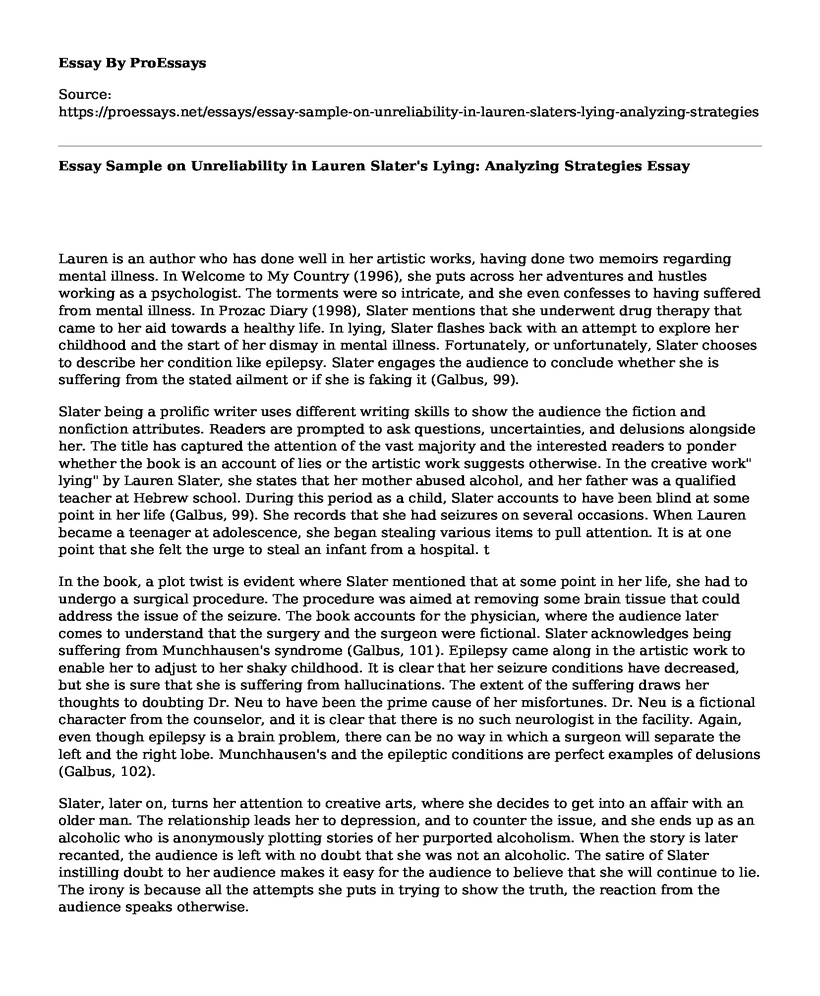Lauren is an author who has done well in her artistic works, having done two memoirs regarding mental illness. In Welcome to My Country (1996), she puts across her adventures and hustles working as a psychologist. The torments were so intricate, and she even confesses to having suffered from mental illness. In Prozac Diary (1998), Slater mentions that she underwent drug therapy that came to her aid towards a healthy life. In lying, Slater flashes back with an attempt to explore her childhood and the start of her dismay in mental illness. Fortunately, or unfortunately, Slater chooses to describe her condition like epilepsy. Slater engages the audience to conclude whether she is suffering from the stated ailment or if she is faking it (Galbus, 99).
Slater being a prolific writer uses different writing skills to show the audience the fiction and nonfiction attributes. Readers are prompted to ask questions, uncertainties, and delusions alongside her. The title has captured the attention of the vast majority and the interested readers to ponder whether the book is an account of lies or the artistic work suggests otherwise. In the creative work" lying" by Lauren Slater, she states that her mother abused alcohol, and her father was a qualified teacher at Hebrew school. During this period as a child, Slater accounts to have been blind at some point in her life (Galbus, 99). She records that she had seizures on several occasions. When Lauren became a teenager at adolescence, she began stealing various items to pull attention. It is at one point that she felt the urge to steal an infant from a hospital. t
In the book, a plot twist is evident where Slater mentioned that at some point in her life, she had to undergo a surgical procedure. The procedure was aimed at removing some brain tissue that could address the issue of the seizure. The book accounts for the physician, where the audience later comes to understand that the surgery and the surgeon were fictional. Slater acknowledges being suffering from Munchhausen's syndrome (Galbus, 101). Epilepsy came along in the artistic work to enable her to adjust to her shaky childhood. It is clear that her seizure conditions have decreased, but she is sure that she is suffering from hallucinations. The extent of the suffering draws her thoughts to doubting Dr. Neu to have been the prime cause of her misfortunes. Dr. Neu is a fictional character from the counselor, and it is clear that there is no such neurologist in the facility. Again, even though epilepsy is a brain problem, there can be no way in which a surgeon will separate the left and the right lobe. Munchhausen's and the epileptic conditions are perfect examples of delusions (Galbus, 102).
Slater, later on, turns her attention to creative arts, where she decides to get into an affair with an older man. The relationship leads her to depression, and to counter the issue, and she ends up as an alcoholic who is anonymously plotting stories of her purported alcoholism. When the story is later recanted, the audience is left with no doubt that she was not an alcoholic. The satire of Slater instilling doubt to her audience makes it easy for the audience to believe that she will continue to lie. The irony is because all the attempts she puts in trying to show the truth, the reaction from the audience speaks otherwise.
Various episodes are turning out to be false because Lauren had attended a funeral and was in a seizure, which led her to fall in the grave. Slater later confesses that despite her imagining going to the funeral and falling in, she never did. The view of Slater climbing out of the tomb is a representation of her initiation to her adult life escape plus from her mother. The lies are visible from the doctor's appearance in the story, the seizures, the tests carried out, and the family embarrassments. This artistic work instills doubt on the reliability of the memoir itself, the challenge of the mind in perceiving what is real plus the slippery nature of illness and diagnosis (Galbus, 102). The prime objective for Slater is to force the interested parties in forming boundaries between what we know factually and what we perceive to be deception or fiction. In this memoir, Slater discovers what plagues her and what draws her to healing. The art is superb, and what is compulsive and catches the attention of the audience is the fact that she uses lies to lie. The memoir is adventurous but needs a concentrative reader because it is clear the readers get lost in the story. It is amusing that there is no point in time where the narrator points out where she lied, and that is left for the audience to solve the puzzle.
Work Cited
Galbus, Julia. "Lying: A Metaphorical Memoir." (2003): 99-102.
Cite this page
Essay Sample on Unreliability in Lauren Slater's Lying: Analyzing Strategies. (2023, Feb 27). Retrieved from https://proessays.net/essays/essay-sample-on-unreliability-in-lauren-slaters-lying-analyzing-strategies
If you are the original author of this essay and no longer wish to have it published on the ProEssays website, please click below to request its removal:
- Midsummer Night's Dream, Character of Bottom
- Is Hamlet's Madness Truly Feigned or Does He Cross into True Insanity?
- The Sense of Entitlement in Shakespeare's King Lear - Critical Essay
- Essay Example on Rip Van Winkle: A German Folktale Transformed
- Film Analysis Essay on 12 Angry Men
- Essay Sample on Brooklyn Bridge Inspires Poetry: Mayakovsky & Hart Crane
- Paper Example: Wildness in Bell Hooks' Legacy







